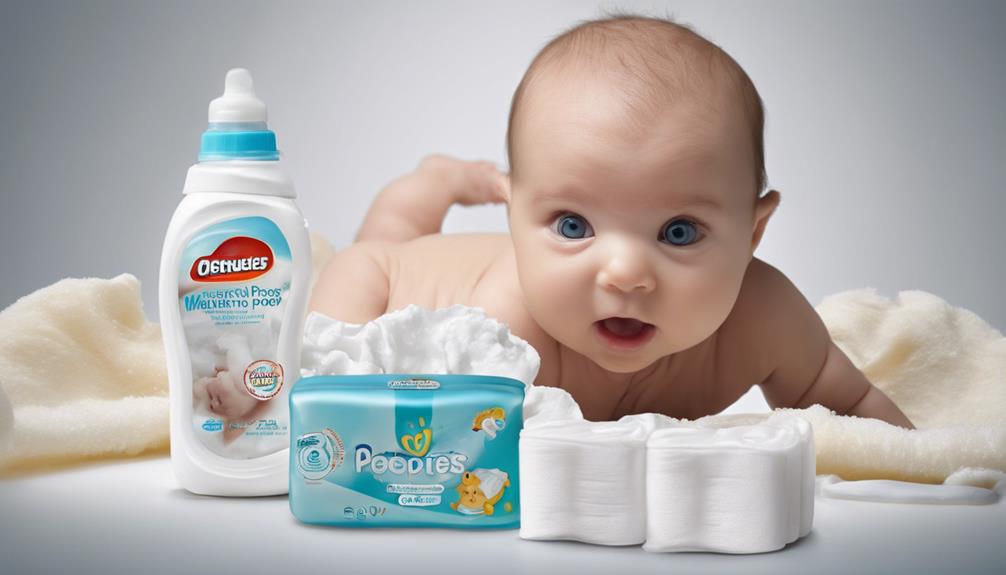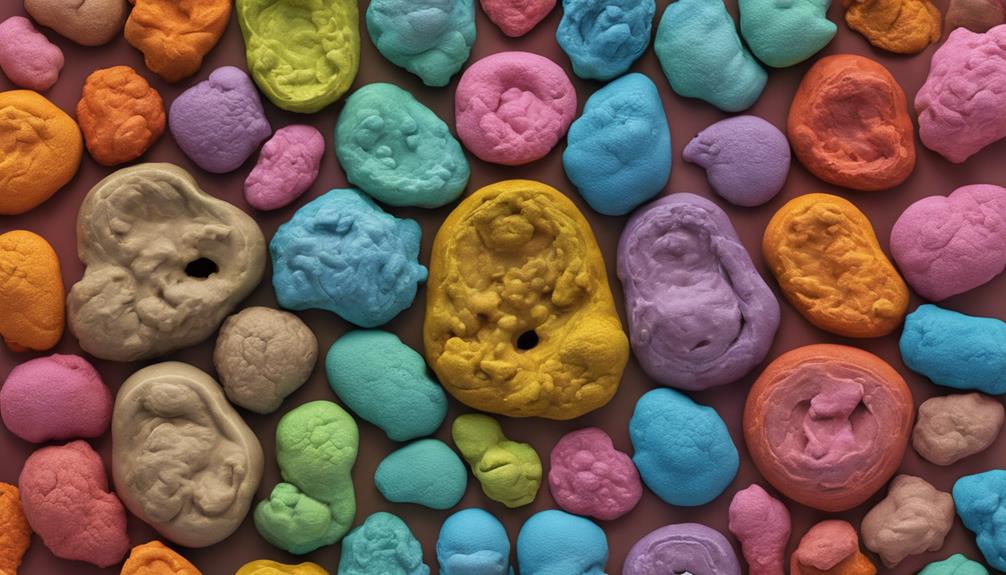Have you ever wondered why newborns sometimes experience watery poop?
Well, it's a common concern among parents, and understanding the root causes can provide clarity and peace of mind.
From viral infections to dietary changes and other factors, various reasons can lead to this situation.
But what about the solutions?
Stay tuned as we explore effective strategies to help manage and alleviate watery stools in your little one, ensuring their health and well-being.
Key Takeaways
- Watery poop in newborns can be caused by infections, allergies, or improper feeding.
- Dehydration signs include reduced urine, dry mouth, and lethargy.
- Diagnosing involves tests, examinations, and identifying the root cause.
- Remedies include dietary adjustments, probiotics, and adequate hydration, with healthcare provider guidance.
Common Causes of Watery Poop
In our experience, the common causes of watery poop in newborns often stem from viral infections like rotavirus and norovirus. These infections can lead to bouts of watery diarrhea in babies, causing distress to both the little one and their caregivers.
Additionally, bacterial infections such as Salmonella and E. coli can also trigger similar symptoms in newborns, requiring prompt attention and care. For breastfed babies, food allergies or intolerances can manifest as watery stools, necessitating a close examination of the mother's diet.
Moreover, factors like improper formula preparation, antibiotic use, or introducing new foods can disrupt a baby's digestive system, resulting in episodes of diarrhea. It's important to monitor for signs of dehydration in newborns experiencing watery poop, as this can lead to serious complications.
Keeping an eye out for diaper rash and other discomforts can aid in early intervention and management of the underlying causes.
Signs of Dehydration in Newborns

Watching out for signs of dehydration in newborns is essential for their well-being and requires prompt attention. It can be worrying to see your little one showing symptoms of dehydration, but being vigilant and knowing what to look for can help you address the issue effectively. Here are some key signs to watch for:
- Reduced urine output: Pay attention to the number of wet diapers your newborn has. A decrease in urine production may indicate dehydration.
- Dry mouth: Check if your baby's mouth appears dry or sticky, as this could be a sign of insufficient fluid intake.
- Sunken fontanelle: The soft spot on the top of the baby's head can appear sunken when they're dehydrated, indicating a fluid imbalance.
If you notice any of these signs, along with lethargy or irritability, it's important to consult a healthcare provider. They may recommend oral rehydration solutions or other medical interventions to address the dehydration and make sure proper hydration management for your newborn.
Diagnosing Watery Stools in Infants
Upon encountering watery stools in infants, healthcare providers typically conduct a series of diagnostic assessments to pinpoint the underlying cause. Viral infections, such as Rotavirus, and bacterial infections like Salmonella or E. coli are common culprits of watery diarrhea in newborns. These conditions can result from various factors including food intolerances or antibiotic usage.
To diagnose the cause of watery stools in infants, healthcare professionals may perform stool tests, physical examinations, and review the infant's medical history. Identifying the root of the issue is essential for initiating appropriate treatment and management.
Remedies for Watery Poop

When addressing watery poop in newborns, exploring remedies that align with the baby's diet and gut health can play an important role in promoting stool consistency and overall well-being. Here are some effective remedies to contemplate:
- Adjust the Baby's Diet: Making small changes to the baby's diet, such as avoiding sugary foods and drinks, can help ease digestion and reduce the likelihood of watery stools.
- Provide Probiotics: Introducing probiotics to the baby's feeding routine can aid in restoring healthy gut flora, which may lead to improved stool consistency over time.
- Focus on Hydration: Ensuring the baby stays well-hydrated is vital in managing watery poop. Offer frequent feedings of breast milk or formula to help maintain hydration levels.
Consulting a Healthcare Provider
Seeking guidance from a healthcare provider is vital when your newborn experiences watery poop to guarantee proper evaluation and care. If your baby's diaper contents are consistently watery or soft and you notice other symptoms like fussiness or reduced feeding, it's time to consult a pediatrician. Calling your healthcare provider for advice can provide valuable information on how to manage mild diarrhea and prevent dehydration in your little one.
Your pediatrician can assess the situation, determine if there are any underlying issues causing the watery poop, and recommend the best course of action. Consulting a healthcare provider is essential in ruling out more serious conditions and ensuring your baby receives the appropriate care. Remember, healthcare providers are there to offer support, guidance, and specific advice tailored to your baby's individual needs. Don't hesitate to reach out for help when it comes to your baby's health and well-being.
Frequently Asked Questions
What Should I Do if My Newborn Has Watery Poop?
If our newborn has watery poop, we need to monitor closely for signs of dehydration. Seek medical advice if it lasts over 24 hours, has blood/mucus, or comes with a fever. Hydration is essential.
Why Is My Newborn Poo Always Runny?
We comprehend the worry when your newborn's poop is always runny. It's common in breastfed babies due to their immature digestive systems. Remember, consulting a pediatrician is essential for reassurance and guidance. Trust your instincts and seek support.
Can Breast Milk Cause Diarrhea in Babies?
Breast milk is unlikely to cause diarrhea in babies as it aids digestion and supports gut health. Changes in a breastfeeding mother's diet can influence milk composition but rarely lead to diarrhea in infants.
Can Overfeeding Cause Diarrhea in Babies?
Yes, overfeeding can cause diarrhea in babies. Their delicate digestive systems struggle with excess milk or formula, leading to watery stools, discomfort, gas, and fussiness. Adjusting feedings based on cues and consulting a pediatrician can help.
Conclusion
To sum up, understanding the causes and solutions for watery poop in newborns is vital for parents. By recognizing common triggers like viral infections and implementing remedies such as proper hydration and feeding practices, caregivers can help their little ones recover swiftly.
Remember, monitoring for signs of dehydration and seeking guidance from healthcare providers are essential steps in ensuring the well-being of your precious bundle of joy. Stay vigilant, stay informed, and stay proactive in managing your newborn's health.










